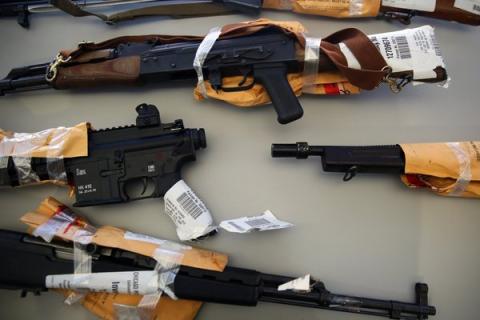When Illinois became the last state in the country to adopt concealed carry, many on both sides were left unsatisfied. Chicago grandfathered in its assault weapons ban. Other towns of at least 25,000 had ten days to enact their own bans under home-rule provision.
The exclusion of an assault weapons ban was one of the points of contention that led to Governor Pat Quinn's initial veto of the legislation. As one of the country's most violent cities, such bans and strict laws carry much weight in Illinois' most populous city, Chicago.
Frequently pointed out by opponents of stricter gun control, Chicago already has some of the toughest gun laws in the country. Critics of gun control might be paraphrased saying that locales with the toughest gun laws end up only disarming law-abiding citizens.
To top it off, Chicago is home to four of the twenty most dangerous neighborhoods in the country.
In the past week, Chicago also saw its 250th homicide of the year.
A recent gun report produced annually by Syracuse University, seen in US News and World Report, says that despite some of the strongest gun laws, Chicago also has the lowest rate of enforcement of them. In fact, the Northern District of Illinois ranked last in the country in prosecutions of federal gun crimes per capita.
Even proponents of less gun regulations, such as the National Rifle Association's boisterous executive vice president, Wayne LaPierre, pointed out that there are already enough gun laws that need to be enforced before any new ones are enacted.
According to a report of Fiscal Year 2011, the last year for which statistics are available from the Illinois Department of Corrections website, there was a total of 48,978 inmates in the state. Murder was the fourth-largest offense. However, all homicides taken together represented the biggest offense category of all Illinois inmates. Violations for controlled substances were a close second.
So while lack of enforcement seems like an issue, confiscation of illegal weapons does not. During the first six months of 2012, Chicago mayor Rahm Emanuel reported that the city had confiscated almost 4,000 firearms. This was more than Los Angeles with 2,296 and New York with 1,385 during the same period.
Perhaps one reason law enforcement is trailing in Illinois is that the state and local governments do not have the resources to strongly prosecute their laws. Mayor Emanuel has also called for strong minimum mandatory sentencing. However, Cook County sheriff Tom Dart insists that is not feasible since they "are fully at capacity right now."
The Cook County jail is so overcrowded it has to house 300 inmates in a former cafeteria and on the prison's hospital floor. Further, if minimum mandatory sentencing was enacted, prison populations would be expected to swell even more. The prison conundrum is also a victim of Illinois' precarious fiscal situation because several facilities have been closed as cost-saving measures.
Guns and gun violence continue to be hotly debated topics in the US today. Simple answers about what causes gun violence and what could prevent it are still elusive. However, there are several factors at work in the debate over Illinois gun control and its situation is unique and each issue must be addressed before solutions are likely to materialize.
